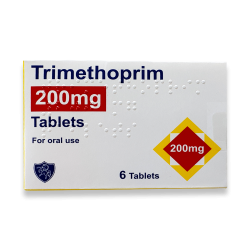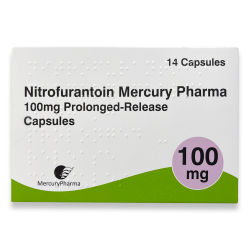All treatments
- Review by a qualified doctor
- Including prescription
- Next-day delivery included
If you had a urine test that indicates your infection is sensitive to Trimethoprim, this is the recommended treatment.
If you have not had a urine test or there is no indication that your infection is sensitive to Trimethoprim, Nitrofurantoin is the recommended treatment.
What causes cystitis?
Cystitis develops because of an infection of the urethra, which is the tube that transports urine from the body. The urethra in women is much shorter and also much closer to the anus, exposing it to intestinal bacteria. However, apart from an exposure to intestinal bacteria, damage to the urethra that results from vigorous sex can also result in infection. You may also be more vulnerable to this condition if you are pregnant, you have a sexually transmitted disease or you are postmenopausal. The use of certain bodily cleansing products may also cause irritation of the urethra that could lead to cystitis symptoms.
Cystitis Symptoms
The signs of a cystitis infection are: a strong and more frequent urge to urinate; a burning sensation when you urinate; passing frequent and small amounts of urine; the presence of blood in your urine; cloudy or strong smelling urine; pelvic discomfort; increased pressure in the lower abdomen or a slight fever.
Preventing cystitis
You can reduce your risk of cystitis by ensuring that you drink plenty of water and that you urinate when you need to, at least once every three hours. You may also want to avoid harsh vaginal cleansing products or the use of perfumed products that could irritate the urethra. After sex you should also try and urinate to remove any bacteria that may have ended up near the bladder.
There is no clinical proof for this, but some women find that drinking plenty of cranberry juice also makes an infection less likely. This may be the case because you are increasing the amount of fluids you are taking in and flushing out the urethra on a regular basis.
Cystitis treatments
There are many home remedies for treatment such as drinking lots of water and taking in cranberry juice, although there is no scientific proof that these measures are specifically helpful. However, generally taking in more water is always a good idea for maintaining general health and well-being.
Painkillers and ibuprofen don't deal with the actual cause of cystitis, but they can provide much needed relief from the symptoms to give your body time to recover. In order to aid recovery, it's also recommended that you avoid having sexual intercourse until you are completely better.
Prescription medication, usually antibiotics, are an option if you have a severe infection that is causing you significant discomfort or one that simply won't go away. The usual treatments in these cases are Trimethoprim and Nitrofurantoin which fight the bacterial cause of the infection and clear the symptoms quickly.
Ordering treatment online
The prescription medications Trimethoprim and Nitrofurantoin are available to order online at 121doc. We ask all our patients to complete a confidential online consultation form when they place their order so that our doctor can evaluate their suitability for a prescription. If a prescription is approved, it's sent to our pharmacy, from where our pharmacist will ensure that your treatment is dispensed, packaged and shipped for overnight delivery.
FAQs
Our consultations include general questions about your health (e.g. blood pressure levels, current and past conditions), as well as specific questions related to your selected treatment. We will also request relevant personal information to complete payment and delivery.
All questions are necessary, and your answers and details will not be shared with any third-parties. Only our doctors have access to your medical information.



